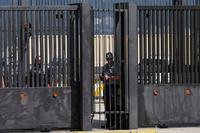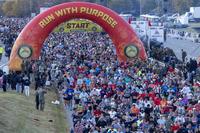The commanding general of III Marine Expeditionary Force has ordered a stop to all MV-22 Osprey flight operations in Japan until safety procedures can be reviewed after one of the tiltrotor aircraft was forced to make an emergency shallow-water landing off the coast of Okinawa on Tuesday.
In a press conference in Okinawa following the incident, Lt. Gen. Lawrence Nicholson said the aircraft had been conducting aerial refueling operations over water when the rotor blades hit the refueling line, causing damage to the aircraft.
"After the aircraft was unhooking, it was shaking violently," Nicholson said, according to a III MEF news release. "The pilot made a decision to not fly over Okinawan homes and families. He made a conscious decision to try to reach Camp Schwab … and land in the shallow water to protect his crew and the people of Okinawa."
All five Marine crew members aboard the Osprey were rescued from the aircraft and taken to the naval hospital at Camp Foster for treatment following the crash. According to the release, three have been released, and two remain under observation. Their current condition was not described.
III MEF officials said a salvage survey is being conducted to determine how best to recover the damaged Osprey safely, while protecting the environment. An investigation into the incident is ongoing.
During the press conference, Nicholson thanked the Japan Coast Guard and the Okinawan police for their assistance in responding to the crash.
"I regret that this incident took place," Nicholson said. "We are thankful for all the thoughts and prayers the people of Okinawa gave to our injured crew."
The Marines' use of the Osprey on Okinawa has long been a point of contention among residents, many of whom fear that the aircraft might be especially prone to crashes given its history of deadly incidents in its early days. When additional Ospreys arrived at Marine Corps Air Station Futenma in 2012, locals held protests to oppose the move.
This is the second time in four months that Nicholson has ordered an operational pause for aircraft in Japan. In September, he ordered AV-8B Harriers in the region to temporarily halt operations after one of the aircraft crashed off of Okinawa.
-- Hope Hodge Seck can be reached at hope.seck@military.com. Follow her on Twitter at@HopeSeck.































